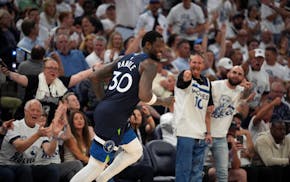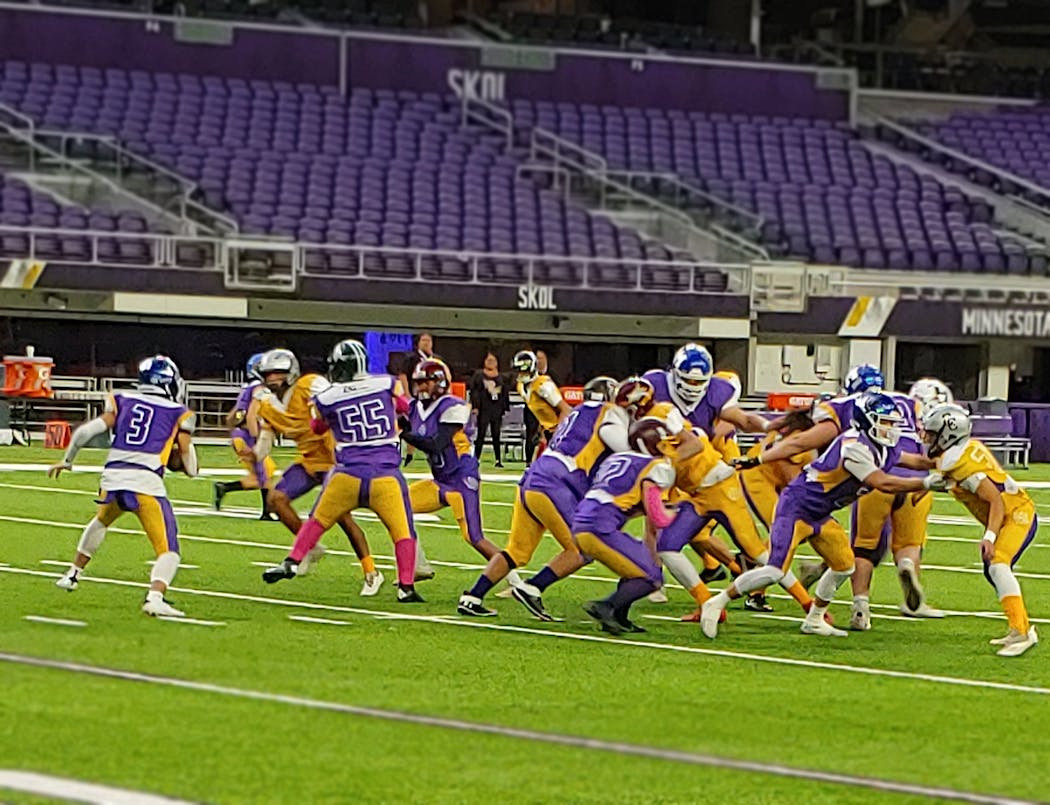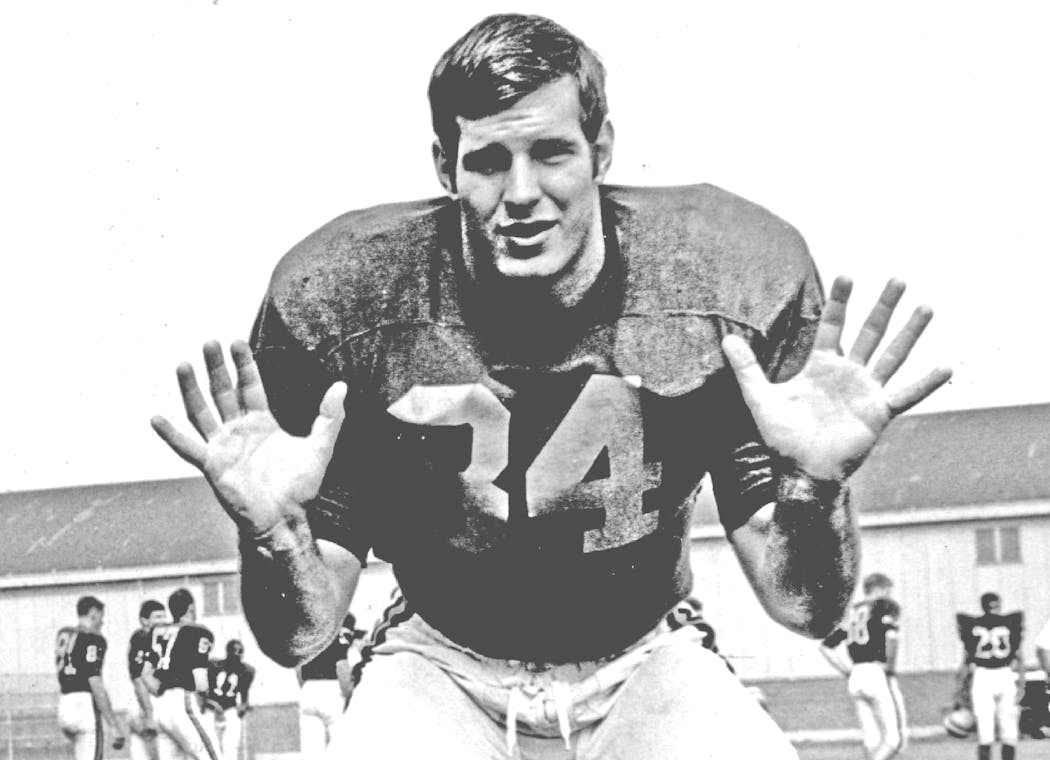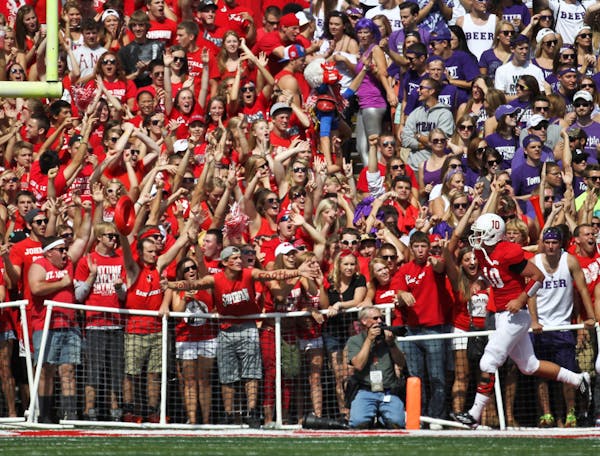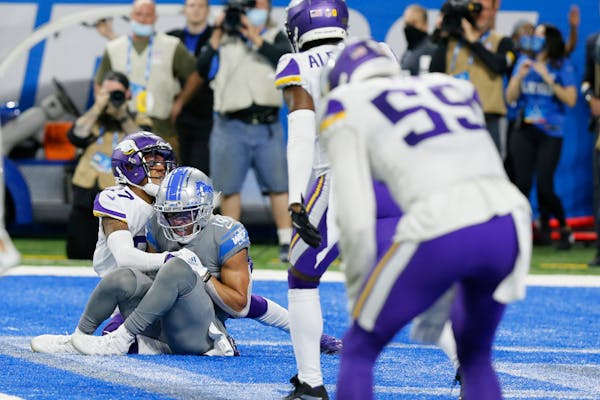Thank you for reading Football Across Minnesota (FAM), my weekly column that tours football topics in our state from preps to pros. You can find all the previous FAM columns right here. — Chip
. . .
Mike Zimmer opened his postgame news conference Sunday with this gem: "OK, probably didn't play well enough to win today."
Probably?
Yep, and my eating multiple Christmas cookies every day this weekend was probably bad for my diet. (Those little devils are irresistible.)
The Vikings most definitely didn't play well enough to leave Detroit with a win. They didn't coach well enough either, and that's the focus of FAM in the aftermath of a 29-27 loss that feels like it has an epitaph attached to it.
Zimmer had a series of decisions that backfired. Here are five that left me baffled.
1) Shuffling the offensive line
Starting left tackle Christian Darrisaw was unavailable because of an injury. In response, Zimmer's staff took struggling right guard Oli Udoh and moved him to the most important position on the line.
Where is Rashod Hill? Isn't that scenario precisely why Hill has a roster spot? As a veteran emergency replacement when a starter gets injured.
Instead, the coaching staff disrupted three positions by inserting Garrett Bradbury back into the lineup at center and moving Mason Cole from center to right guard. That is a lot of shuffling for a team that is fighting for its playoff life.
Predictably, Udoh looked out of sorts. He had two false start penalties, giving him 14 penalties this season. ProFootballFocus credited him with giving up one sack and four pressures at left tackle. If he was their best option, that is a major red flag on General Manager Rick Spielman's roster construction.
2) Fourth-down gamble
I normally applaud aggressive play calls and game management, but Zimmer went too far past the line with a fourth-down call at the end of the first half, costing his team three points.
The Vikings faced fourth-and-10 at the Detroit 42 with 35 seconds left. Zimmer opted to go for it, and Kirk Cousins was sacked before he flipped the ball away at the last second.
That whole sequence was confounding. On third down, Cousins threw the ball 25 yards downfield to Justin Jefferson and was nearly intercepted. If Zimmer's plan was to go for it on fourth down, why not run something higher percentage to make fourth down more manageable? They only needed a handful of yards to get into field-goal range.
Trailing 17-6, even a punt would have been preferable because failing to get a first down gave the Lions ideal field position to squeeze in a field goal before halftime. Those three points proved to be costly.
3) Chasing points too early
Zimmer elected to start chasing points midway through the third quarter, which was unnecessary. Alexander Mattison's 8-yard touchdown run cut Detroit's lead to 20-15 with 6 minutes, 13 seconds remaining in the quarter. The Vikings had plenty of game left. Just kick the extra point. Instead, Zimmer called for a two-point conversion, which failed and thus forced his hand after subsequent scores.
The Vikings compounded the issue with terrible play calls by offensive coordinator Klint Kubiak on the first two conversions, which Zimmer essentially admitted after the game.
4) No pressure on Goff
The culprit? Prevent defense. Zimmer opted not to pressure Jared Goff to disrupt his timing.
My colleague Ben Goessling broke down the final drive in his game insider. Of the 14 plays (which included two spikes), Zimmer sent six rushers only once, which resulted in their only pressure.
The Vikings sent four rushers on seven passes and only three rushers on the final four plays.
The lack of pressure made Goff feel comfortable and gave him time to find his receivers. He completed nine of 12 passes on the drive, including the walk-off touchdown pass.
5) Soft coverage
Safety Harrison Smith perfectly summed up the issues on the final drive: "We were just too soft on them."
Zimmer called two timeouts in the final 12 seconds to set his defense, including before the final play on fourth down. Apparently, he told his defensive backs to back waaaaaaaaay off the receivers because the cushion could not have been any softer.
On the final play, Cameron Dantzler lined up 10 yards off receiver Amon-Ra St. Brown and then backpedaled nonchalantly into the end zone. St. Brown ran into the end zone, turned and caught the pass before Dantzler and safety Xavier Woods closed on him. It looked like an easy pitch-and-catch between a quarterback who faced no pressure and a receiver who wasn't covered tightly.
And that's how you lose to the winless Lions.
. . .
INDIGENOUS BOWL
A bowl to break down barriers
Valarian Thompson's junior season at Deer River ended in the Class 1A quarterfinals in a 20-6 loss to New York Mills, one game away from a trip to U.S. Bank Stadium.
"I don't want to remember that game," Thompson said with a smile.
He still got to live out a dream of playing at the Vikings home stadium this weekend. Thompson was one of 54 Native American high school players who participated in the Indigenous Bowl, a showcase event that was hosted by the Vikings and NFL.
Players representing tribes from across the country spent five days in the Twin Cities for events and practices that culminated with Sunday's all-star game.
"It's an honor getting to play with other Natives," said Thompson, who joined Shakopee senior Lennox Lasley as Minnesotans in the game.
The event is put on by the 7G Foundation, which was started by Bennae Calac, who described her idea as a "mom who saw a need."
Calac's son, Edward, played high school football in California. He was decorated with awards for his play but drew little interest from college recruiters.
He attended a camp hosted by the Rams on the Soboba Reservation. His mom made connections with the NFL through that event and eventually created the foundation, which is named in honor of seven Native American players who were invited to the NFL's 2018 Pro Bowl in Orlando.
Calac saw an opportunity to create recognition for Native American players who want to play beyond high school. Their Pro Bowl experience spurred the idea of annual all-star game for some of the best players in the country.
"The barriers that we have because of rural reservations and exposure, people don't know how to find us," Calac said.
They held the first two Indigenous Bowl events in California. Calac and her team worked with the NFL to expand the game's presence. More than 350 kids applied for this year's game. Calac helps select rosters by studying game video of players and reviewing their credentials.
The Vikings became the first team to host the event in an NFL stadium. They offered U.S. Bank Stadium free of charge.
"Every time I talk to [Vikings officials] I want to cry," Calac said. "We're just so thankful."
The festivities featured daily breakout sessions on different topics, a speech from Alan Page and a banquet on Saturday with a keynote address by Minnesota Lt. Gov. Peggy Flanagan, a member of the White Earth Band of Ojibwe.
Sen. Amy Klobuchar delivered a taped speech that was played on the scoreboard after the first quarter of the game. NFL Films sent a production crew to document the game.
"Not a lot of Native kids get this opportunity," Lasley said.
7G's goal is to provide players a platform that draws more attention from college recruiters. Minnesota Morris coach Marty Hoffmann already planned to be there Sunday on a recruiting trip.
Minnesota Morris has a waiver program that offers free or reduced tuition for Native American students. Hoffmann said that program makes the Indigenous Bowl a valuable resource for his program; he signed four players from the 2019 game. He is recruiting about 10 who played Sunday to join a roster that consists of 20% to 25% Native American players.
The game featured several highlight throws by quarterbacks and catches by receivers. Fans were allowed to attend for free. Kudos to the Vikings and NFL for taking a leading role in giving deserving young men a chance to showcase their talent. Let's hope other NFL teams do the same in years to come.
. . .
LOVE OF THE GAME
Congratulations to Bob Stein, Hall of Famer
The way Bob Stein remembers his first college start for the Gophers back in 1966, he had tears flowing from being so emotional.
His father, instrumental in Stein choosing to play football at the U, died of a heart attack that February. Then Stein was diagnosed with mono before training camp, causing him to miss the first three games. He made his college debut at Indiana as a backup defensive end, while also handling kicking duties. He started the following week at home against Iowa on Homecoming.
"I kicked off and all I could think about was the frustration about my dad," he recalled. "I'm running down the field yelling with tears in my eyes. Who can I hit?"
Stein collected five tackles for loss in a shutout, which stands as the second-most single-game TFLs in program history.
Stein's ability to disrupt offenses earned him All-America status his final two seasons and, on Tuesday, a spot in the College Football Hall of Fame. Stein will be inducted at a ceremony in Las Vegas. He is a member of the 2020 class, but COVID canceled the ceremony last year. The National Football Foundation will induct the 2020 and 2021 classes together on Tuesday.
Stein, 73, had been a finalist for the Hall of Fame several times and initially thought his eligibility ended 50 years after his final game in 1968. The NFF surprised him with the news.
"I about fell on my face," he said. "If I hadn't been sitting down, I would have fallen."
Stein helped the Gophers finish the '67 season as co-Big Ten champions under Murray Warmath, a coach who struck fear in him as a player but later become his friend.
"There was no messing around with him at all," Stein said. "It was all business. When you went in to have a conversation with him, it didn't matter if you had laryngitis because you weren't going to say anything."
Stein wreaked havoc as an edge rusher. He also booted a 40-yard field goal against USC in the 1968 opener, which was a Memorial Stadium record at the time.
Stein and the Gophers defense faced All-America running back O.J. Simpson that day.
"I remember all summer long we watched and saw how long they were letting the grass grow on the field," Stein said. "The week before the game they watered it like crazy thinking it would slow down O.J. and equalize things a little bit."
Didn't work. Simpson rushed for 236 yards and four touchdowns in a 29-20 USC victory.
Did Stein play a good game, too?
"Well, it wasn't good enough," he joked.
. . .
WEEKEND REWIND
Game balls
- Justin Jefferson: One of the lone bright spots for the Vikings, posted a career performance with 11 catches for 182 yards and one touchdown.
- Brandon Alt: Bemidji State sophomore quarterback was named one of eight finalists for the Harlon Hill Trophy, awarded to the Division II national player of the year. He finished second nationally in passing yards and passing touchdowns. The winner is announced Dec. 17.
. . .
He said what?!
"Obviously our backs are to the wall. But they've been back against the wall for a while." — Mike Zimmer on his team's diminishing playoff chances.
. . .
Numbers to know
- 14: Penalties called this season on Vikings offensive lineman Oli Udoh, an NFL high.
- 72: Points allowed by the Vikings in the final two minutes of the first half this season, an NFL high.
- 21: Catches by Justin Jefferson of 20-plus yards, an NFL high.
. . .
UP NEXT
Grab your popcorn
The Vikings have little time to fix all that went wrong against the Lions with Thursday's home game against the Pittsburgh Steelers approaching fast.
. . .
A FAM FINAL WORD
"Brutal"
There is no other way to frame the Vikings' loss and the way they defended the Lions on the final, game-winning drive.
. . .
Thank you for reading Football Across Minnesota. I'll publish this each Monday night on startribune.com, timed to kickoff of "Monday Night Football." And you can also join me on Twitter during the first quarter of MNF as I chat with readers about what I wrote each week.
Thanks, Chip (@chipscoggins on Twitter)
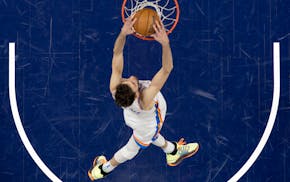
Scoggins: Chet Holmgren is in the right place at the right time
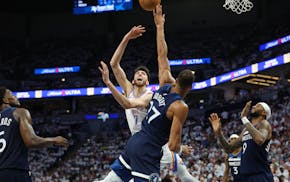
Chet Holmgren remains a basketball unicorn, a status forged in Minnesota and on display in the NBA
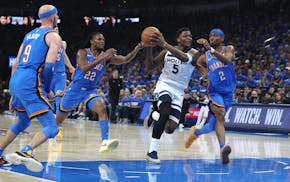
Scoggins: Three observations from the Timberwolves' Game 2 loss
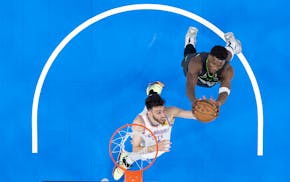
Scoggins: Three observations from the Timberwolves' Game 1 loss
